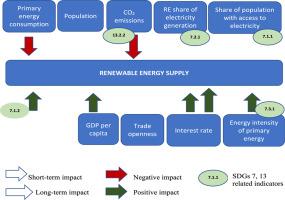New energy-rich or still energy-poor? Evidence from selected African countries
IF 4.4
3区 经济学
Q3 ENERGY & FUELS
引用次数: 0
Abstract
Traditional bioenergy, used in many African nations, is not recognized as a renewable or sustainable energy source. Some countries on the continent are officially leading the way in achieving SDG7, thanks to this type of energy. As of 2020, some African nations had a relatively high proportion of renewable energy (RE) in their primary energy supply, contributing to their enhanced energy self-sufficiency. In this study, 15 low- and lower-middle-income African countries are selected, and the elements that statistically significantly affect high shares of RE supply from 2000 to 2022 are scrutinized. For this purpose, second-generation panel data methods, CS-ARDL, are used to assess the effects of sustainability, economic growth, and energy equity indicators on the share of renewables in primary energy supply. The study shows that in the short term, RE supply is significantly but adversely affected by the total primary energy use. Energy intensity and access to renewable fuels contribute to an increased supply of RE. Moreover, RE supply experiences a strong and favourable influence from both economic expansion and lower interest rates. This study contributes to the body of knowledge on renewable-based energy systems in African countries by underlining the impact of interest rates and other factors that influence RE share in the entire primary energy supply, going beyond the power sector. The findings could serve as an evidence base for decision-makers in drafting evidence-based investment, sustainable development, and development assistance strategies.

新能源丰富还是能源贫乏?来自某些非洲国家的证据
许多非洲国家使用的传统生物能源不被认为是可再生或可持续的能源。由于这种能源,非洲大陆上的一些国家正式在实现可持续发展七国集团方面处于领先地位。截至2020年,一些非洲国家的可再生能源在一次能源供应中所占比例较高,有助于提高能源自给率。在本研究中,选择了15个低收入和中低收入非洲国家,并对2000年至2022年在统计上显著影响可再生能源供应高份额的因素进行了仔细研究。为此,使用第二代面板数据方法CS-ARDL来评估可持续性、经济增长和能源公平指标对可再生能源在一次能源供应中所占份额的影响。研究表明,在短期内,可再生能源供应受到一次能源使用总量的显著不利影响。能源强度和可再生燃料的获取有助于可再生能源供应的增加。此外,可再生能源供应受到经济扩张和较低利率的强烈和有利影响。这项研究通过强调利率和其他影响可再生能源在整个初级能源供应中所占份额的因素的影响,对非洲国家可再生能源系统的知识体系作出了贡献,超出了电力部门。研究结果可作为决策者制定循证投资、可持续发展和发展援助战略的证据基础。
本文章由计算机程序翻译,如有差异,请以英文原文为准。
求助全文
约1分钟内获得全文
求助全文
来源期刊

Utilities Policy
ENERGY & FUELS-ENVIRONMENTAL SCIENCES
CiteScore
6.80
自引率
10.00%
发文量
94
审稿时长
66 days
期刊介绍:
Utilities Policy is deliberately international, interdisciplinary, and intersectoral. Articles address utility trends and issues in both developed and developing economies. Authors and reviewers come from various disciplines, including economics, political science, sociology, law, finance, accounting, management, and engineering. Areas of focus include the utility and network industries providing essential electricity, natural gas, water and wastewater, solid waste, communications, broadband, postal, and public transportation services.
Utilities Policy invites submissions that apply various quantitative and qualitative methods. Contributions are welcome from both established and emerging scholars as well as accomplished practitioners. Interdisciplinary, comparative, and applied works are encouraged. Submissions to the journal should have a clear focus on governance, performance, and/or analysis of public utilities with an aim toward informing the policymaking process and providing recommendations as appropriate. Relevant topics and issues include but are not limited to industry structures and ownership, market design and dynamics, economic development, resource planning, system modeling, accounting and finance, infrastructure investment, supply and demand efficiency, strategic management and productivity, network operations and integration, supply chains, adaptation and flexibility, service-quality standards, benchmarking and metrics, benefit-cost analysis, behavior and incentives, pricing and demand response, economic and environmental regulation, regulatory performance and impact, restructuring and deregulation, and policy institutions.
 求助内容:
求助内容: 应助结果提醒方式:
应助结果提醒方式:


